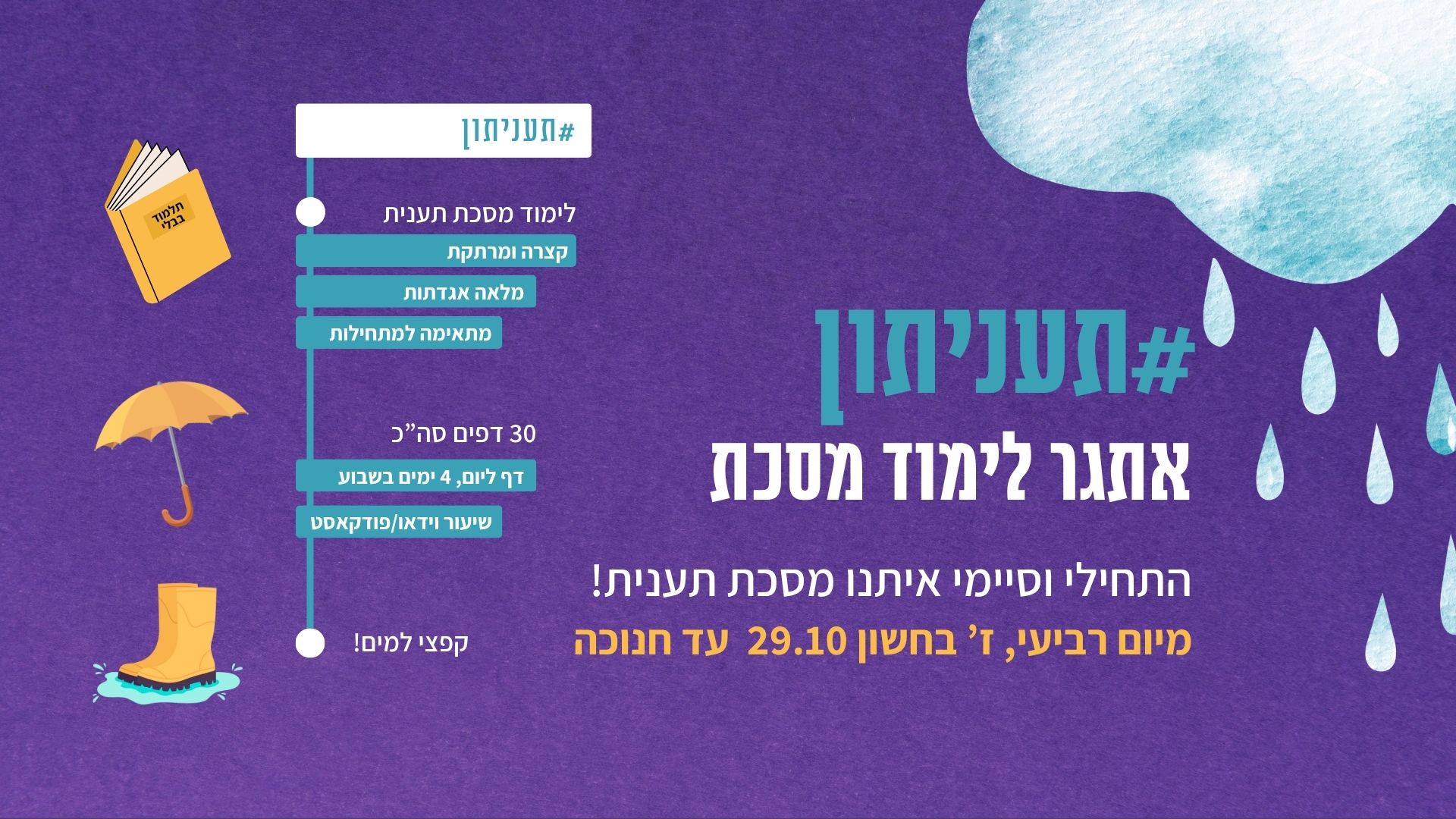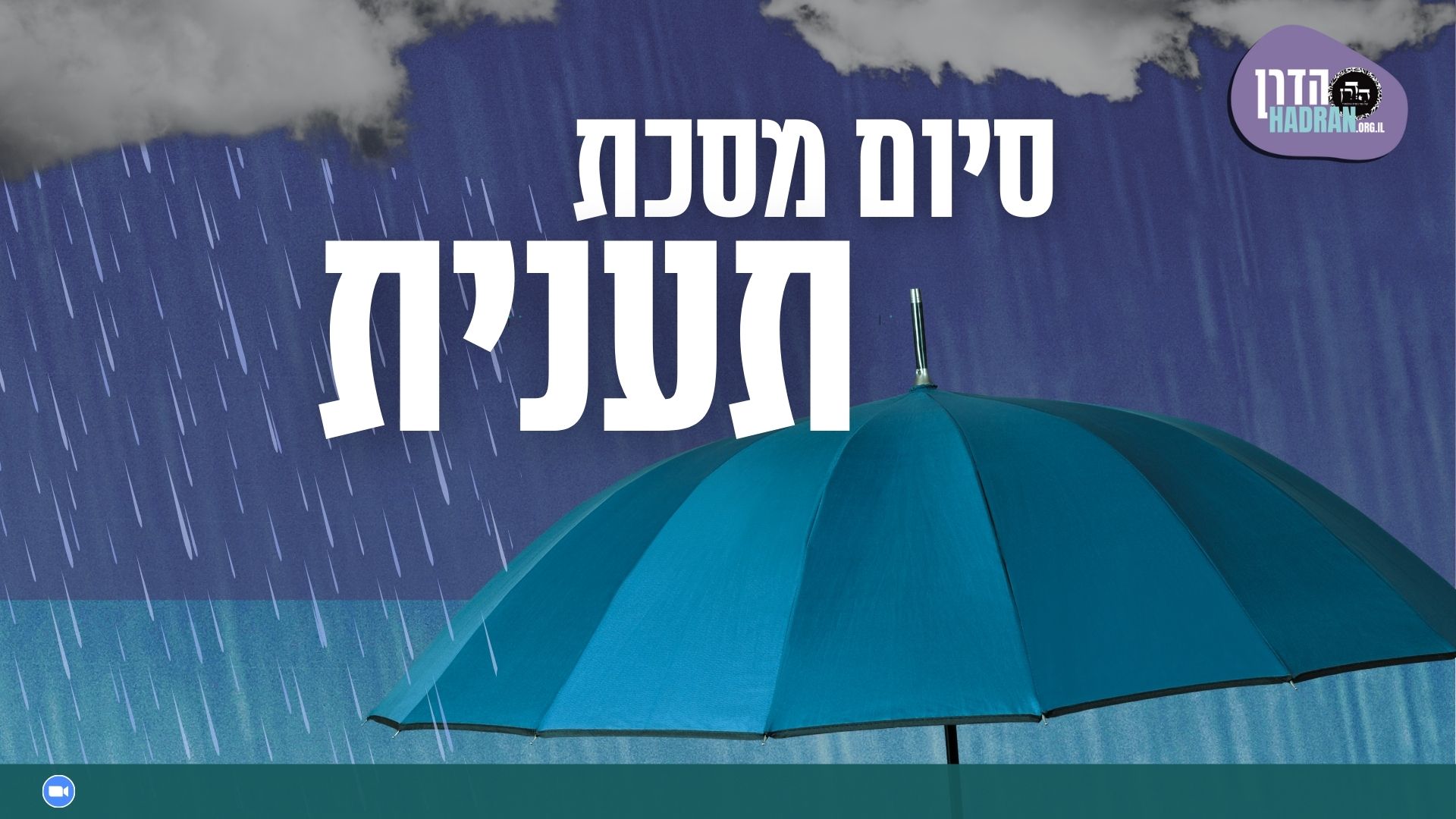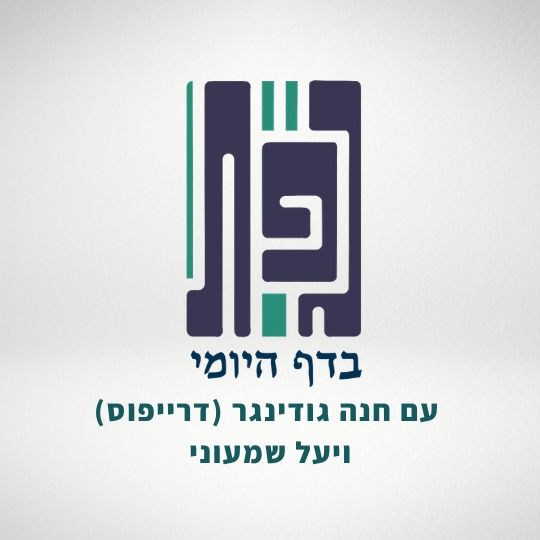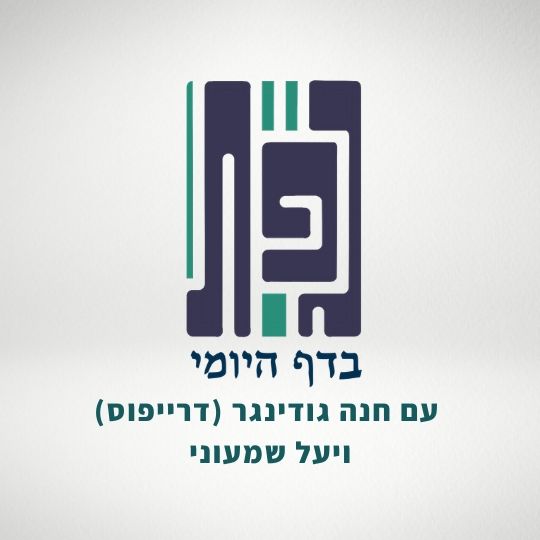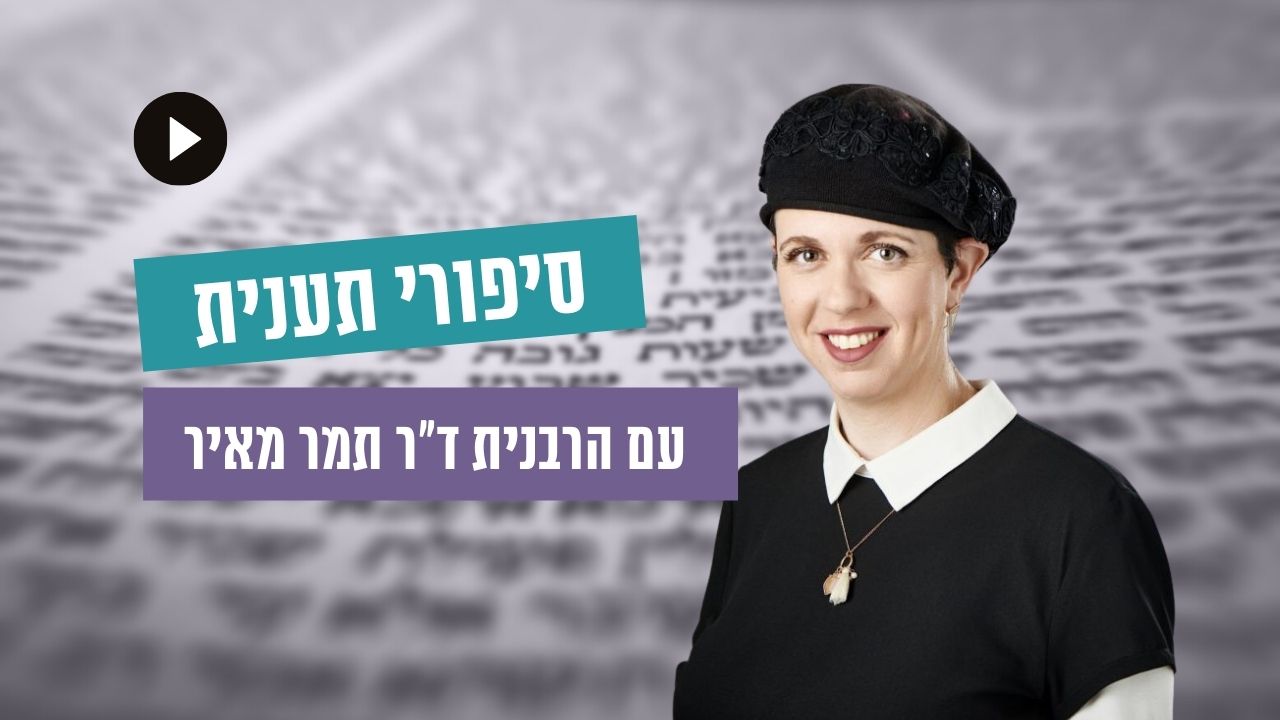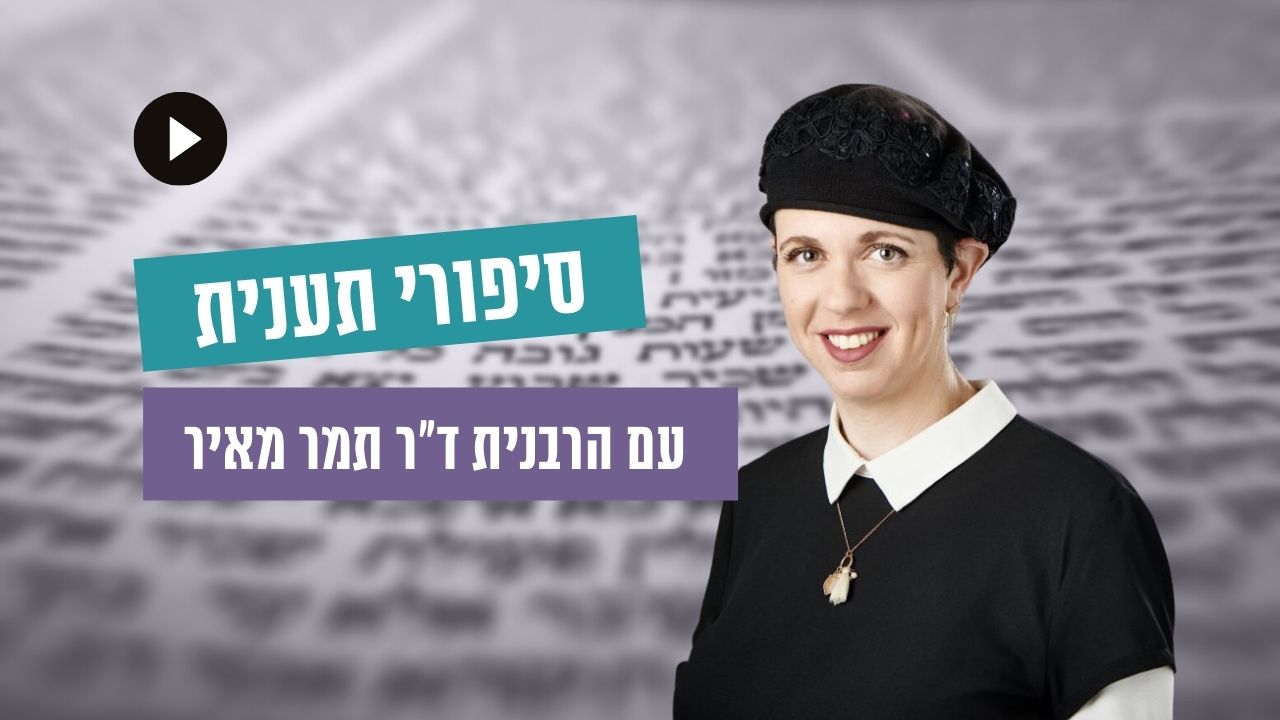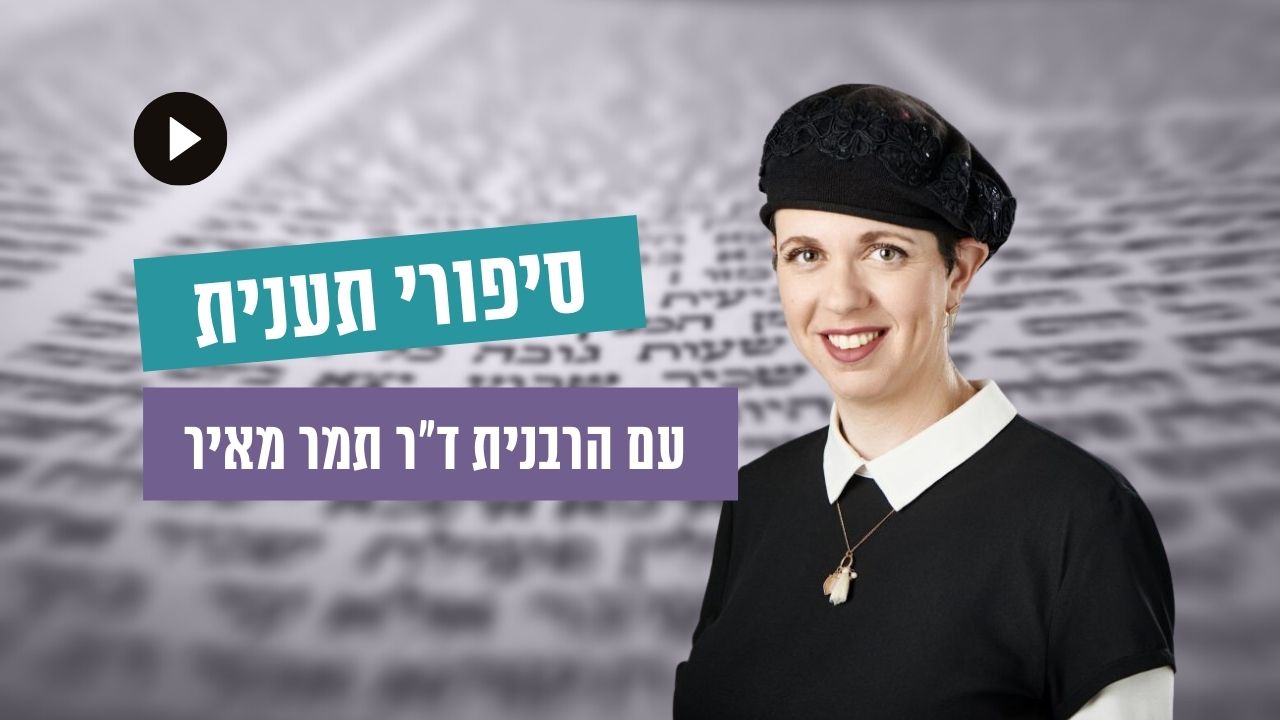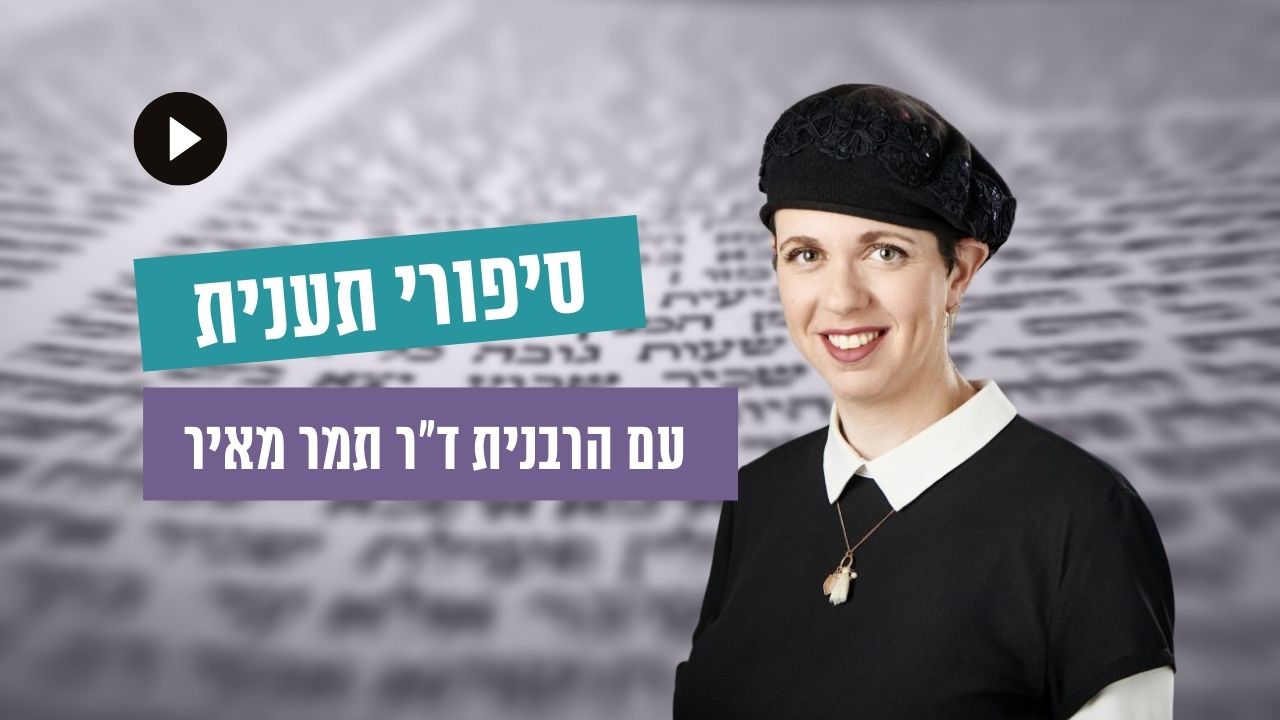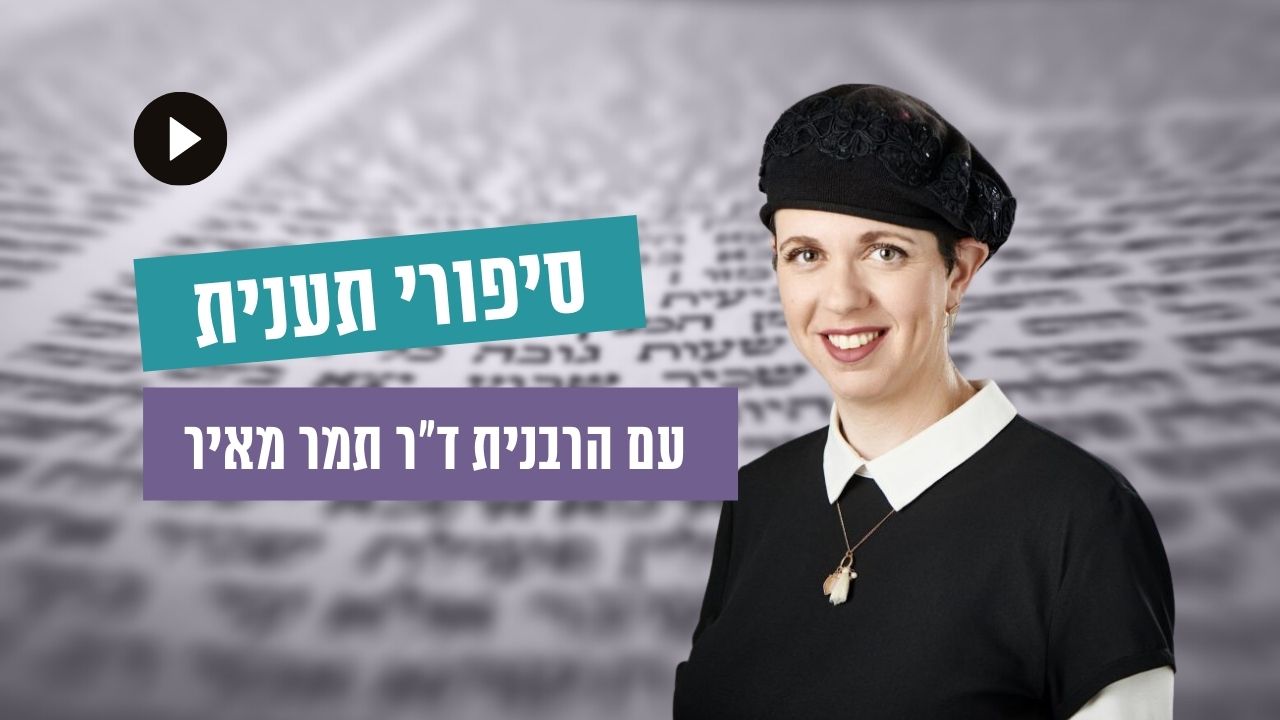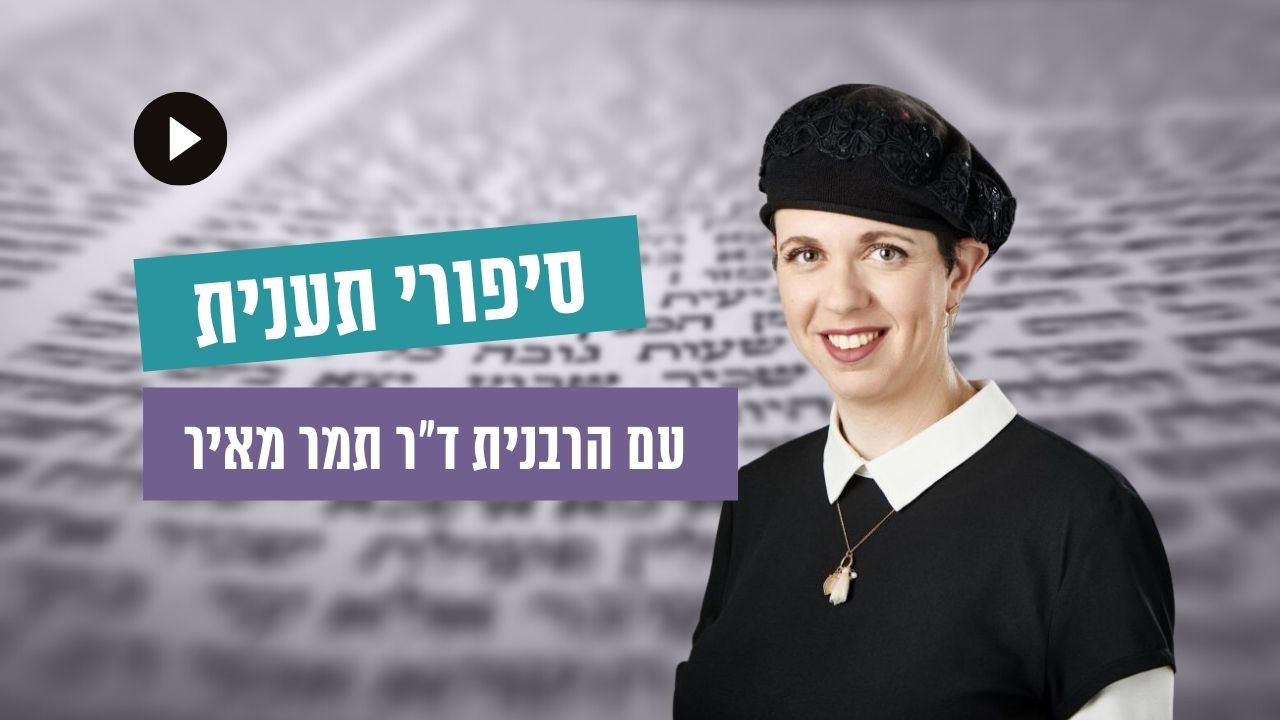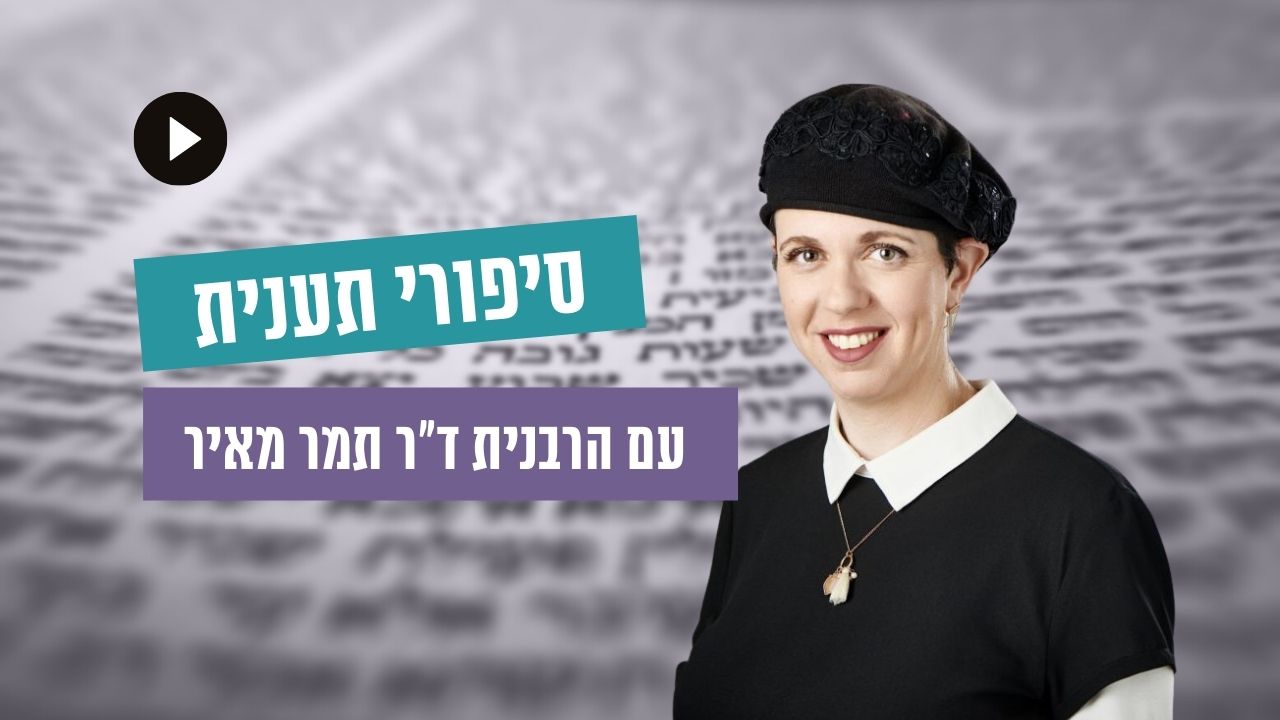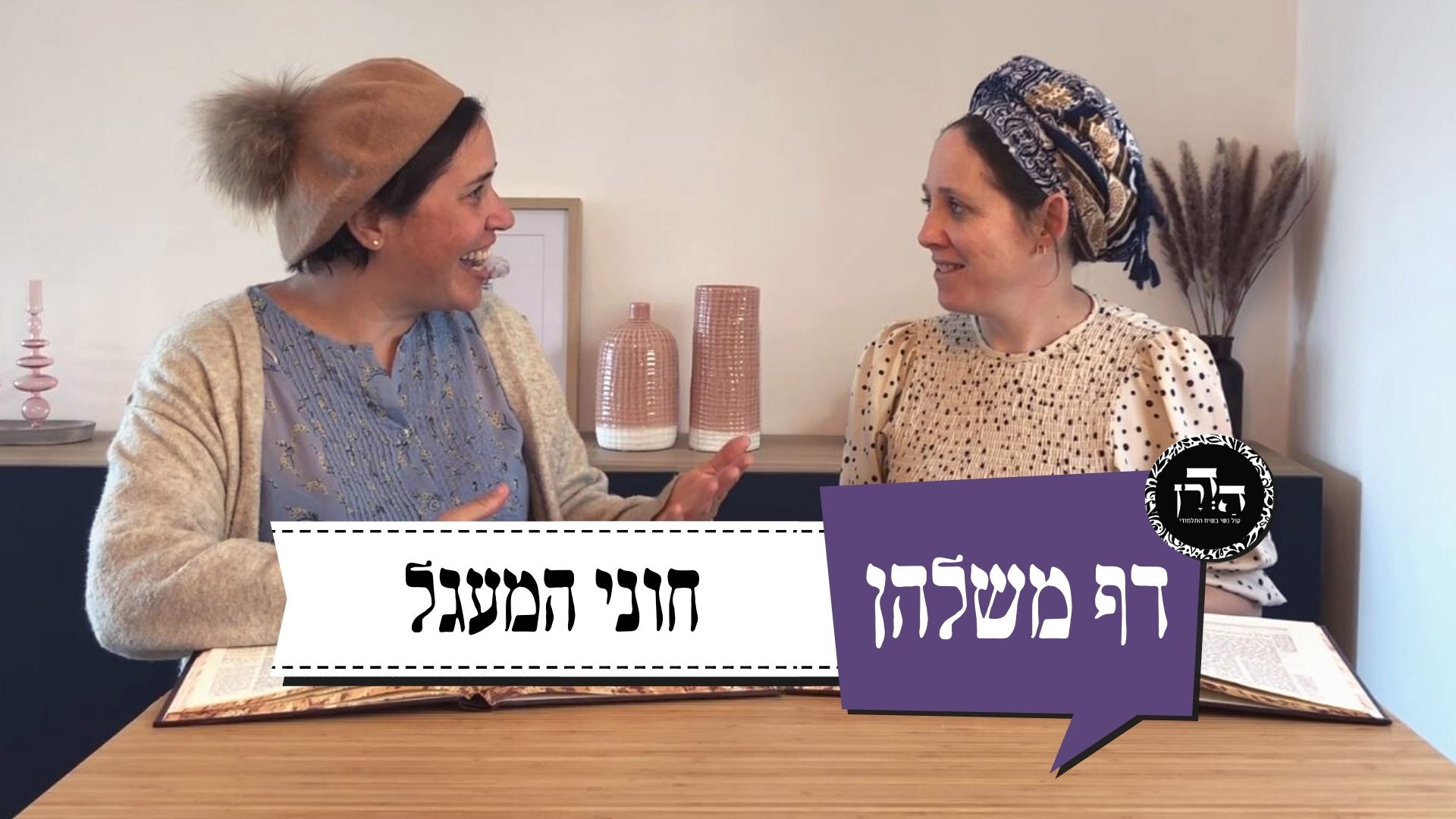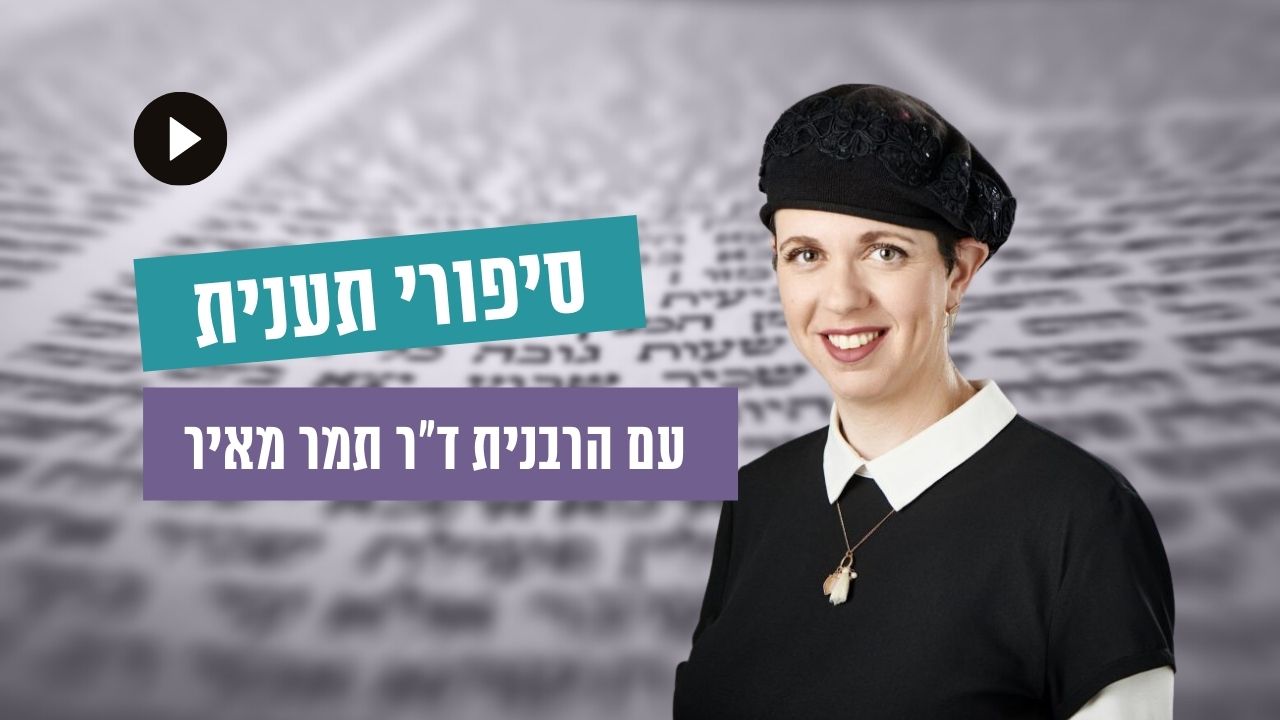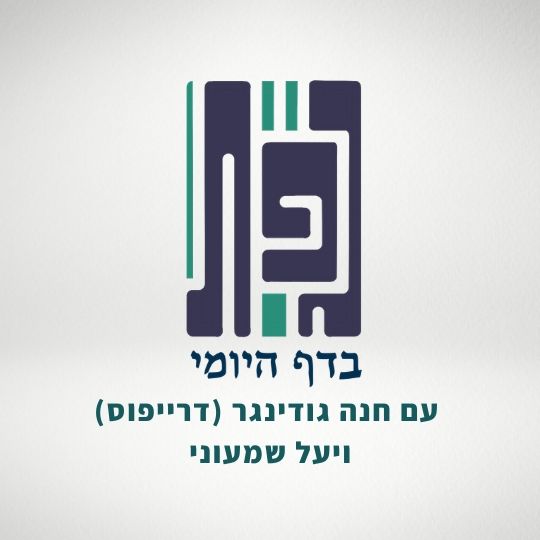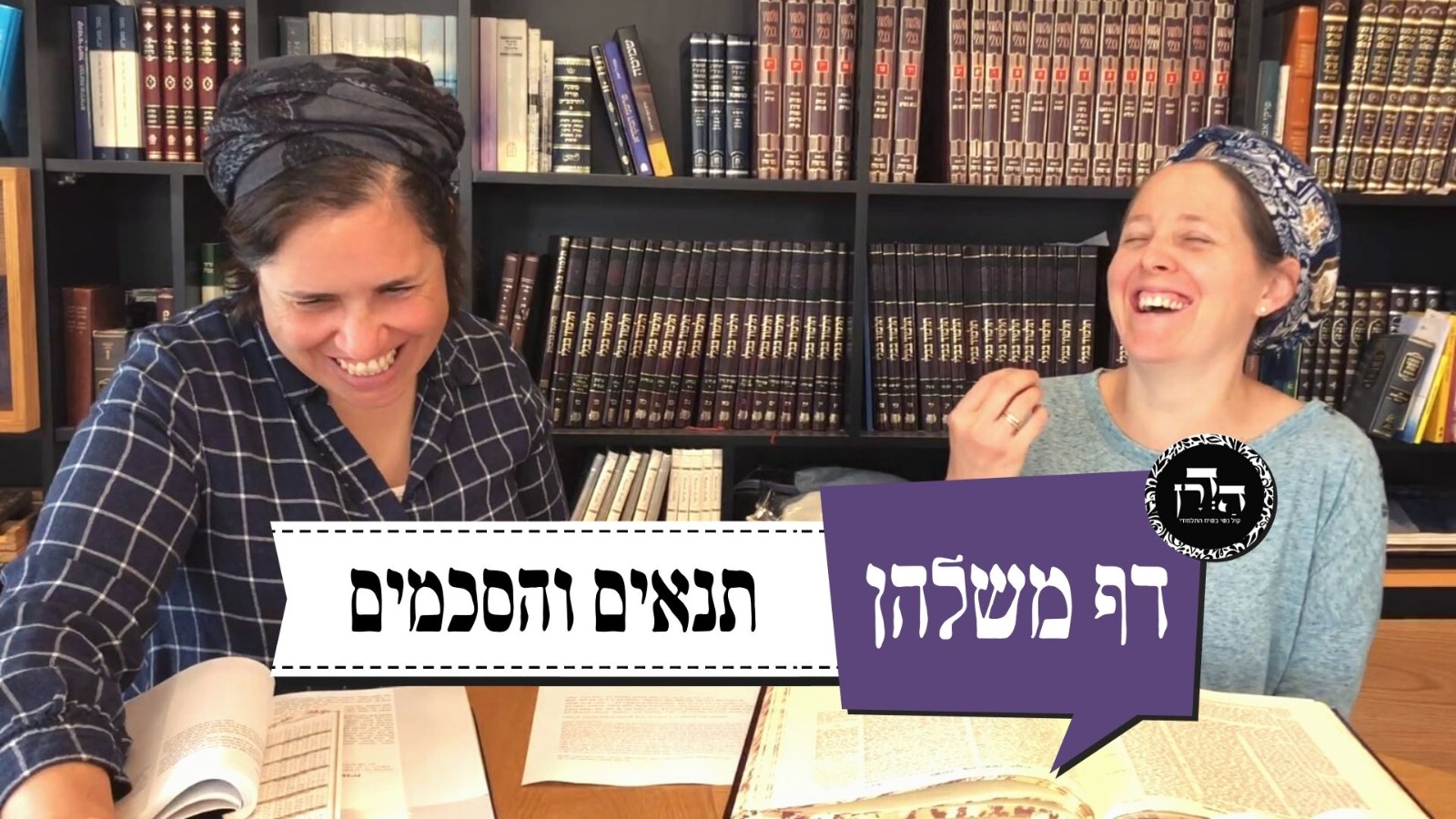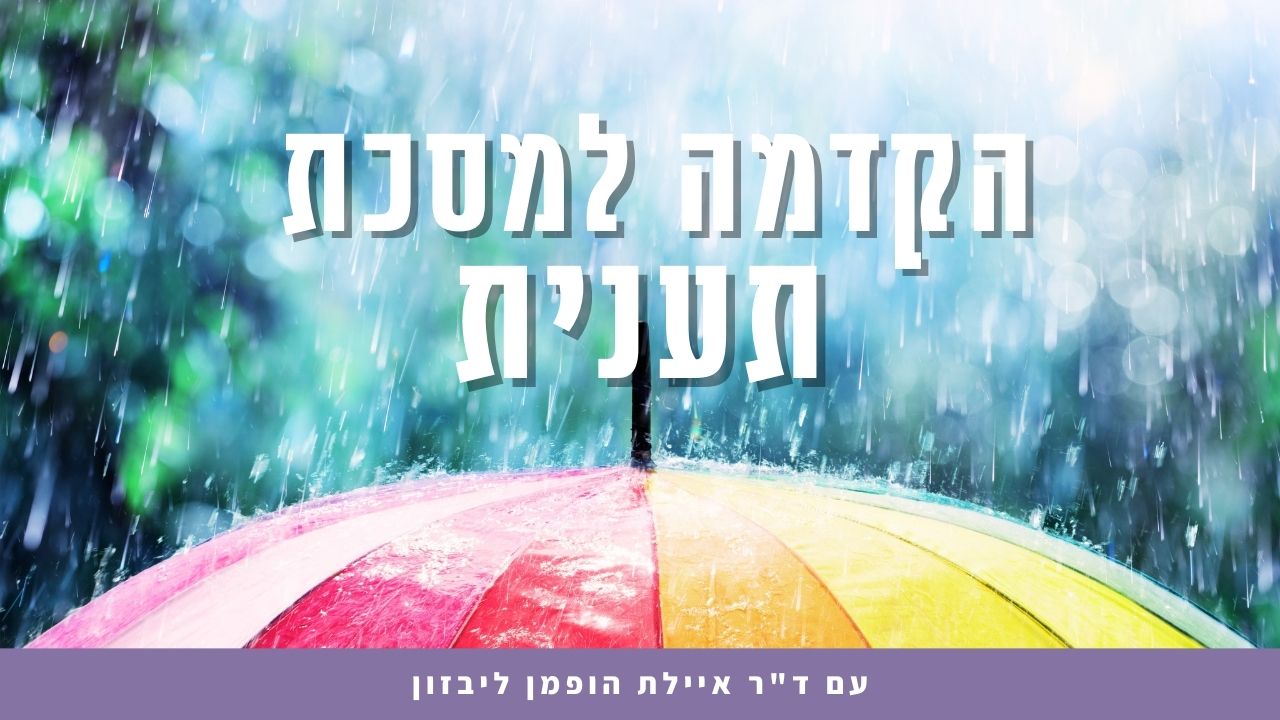הלשון בחלק מהברכות הנוספות בתעניות ציבור היא נושא לוויכוח. מה עומד מאחורי הדעות? מה ההבדלים לגבי הלכות כגון איסור שתיית יין לכהנים במשמר בבית המקדש באותו שבוע לבין אלו שחלק מהמשפחה שעובדת באותו היום? אותם דינים חלים גם אם הכהנים לא מגיעים לבית המקדש או כנראה גם בימינו שאין בית המקדש. למה? מה הדין למי שכבר לא יודע מהו השבוע שבו הוא אמור להיות שם – האם מותר לו אי פעם לשתות יין? באיזו תדירות מסתפר מלך או כהן גדול? מהן הבעיות לגבי גדילת שיער לכהנים רגילים? פרטים נדרשים מפרטי דין של הנזיר. האם חוקים אלה ישימים גם היום? מהיכן לומדים שיש איסור לכהן לגדל שערו או לשתות יין? האם יש סיבה להבחין ביניהם בימינו? מגילת תענית מציינת ימים שאי אפשר להספיד. רבי יוסי לומד שגם יום לפני ואחרי אסורים. שני מקרים המוזכרים במגילת תענית מובאים – א’-ח’ בניסן ו-ח’ בניסן עד סוף פסח. ביחס למקרים אלו עולות מספר שאלות.
הלימוד השבוע מוקדש ע”י נירה פלדמן לע”נ פיי דרק.
הלימוד השבוע מוקדש ע”י נירה פלדמן לע”נ פיי דרק.
רוצה להקדיש שיעור?

כלים
הלימוד השבוע מוקדש ע”י נירה פלדמן לע”נ פיי דרק.
הלימוד השבוע מוקדש ע”י נירה פלדמן לע”נ פיי דרק.
כלים
העמקה
רוצה להבין מה באמת קורה מתחת לפני השטח של הסוגיה?
שיעורים, פודקאסטים והרחבות של מיטב המורות שלנו יפתחו לך עוד זוויות וכיווני חשיבה.
חדשה בלימוד הגמרא?
זה הדף הראשון שלך? איזו התרגשות עצומה! יש לנו בדיוק את התכנים והכלים שיעזרו לך לעשות את הצעדים הראשונים ללמידה בקצב וברמה שלך, כך תוכלי להרגיש בנוח גם בתוך הסוגיות המורכבות ומאתגרות.
פסיפס הלומדות שלנו
גלי את קהילת הלומדות שלנו, מגוון נשים, רקעים וסיפורים. כולן חלק מתנועה ומסע מרגש ועוצמתי.
תענית יז
אֶלָּא בְּרֹאשׁ הַשָּׁנָה, וּבַיּוֹבְלוֹת, וּבִשְׁעַת מִלְחָמָה.
only on Rosh HaShana, and on Yom Kippur of Jubilee Years, and in a time of war.
עַל הָרִאשׁוֹנָה הוּא אוֹמֵר: מִי שֶׁעָנָה אֶת אַבְרָהָם כּוּ׳. תָּנָא: יֵשׁ מַחְלִיפִין צְעָקָה לְאֵלִיָּהוּ, וּתְפִלָּה לִשְׁמוּאֵל. בִּשְׁלָמָא גַּבֵּי שְׁמוּאֵל — כְּתִיב בֵּיהּ תְּפִלָּה וּכְתִיב בֵּיהּ צְעָקָה.
§ The mishna teaches: For the first blessing he recites: He Who answered Abraham. It was taught in a baraita: Some reverse the order of the conclusion of two blessings, by reciting: Who hears cries, in the fifth blessing, which deals with Elijah, and the conclusion: Who hears prayer, in the blessing of Samuel. The Gemara asks: Granted, with regard to Samuel both options are appropriate, as it is written concerning him: Prayer, and it is likewise written concerning him: Crying. One verse states: “And Samuel said: Gather all of Israel to Mizpah, and I will pray for you to the Lord” (I Samuel 7:5), while another verse states: “And Samuel cried to the Lord for Israel” (I Samuel 7:9).
אֶלָּא גַּבֵּי אֵלִיָּהוּ — תְּפִלָּה כְּתִיב, צְעָקָה לָא כְּתִיב! ״עֲנֵנִי ה׳ עֲנֵנִי״ לְשׁוֹן צְעָקָה הִיא.
However, with regard to Elijah, although prayer is written, as it says: “Elijah the prophet came near and said: Lord, the God of Abraham, of Isaac, and of Israel” (I Kings 18:36), which is referring to a prayer, crying is not written. How, then, can one conclude a blessing that deals with Elijah by mentioning crying? The Gemara answers that Elijah’s statement: “Answer me, Lord, answer me” (I Kings 18:37), is an expression of crying, even if the term crying does not itself actually appear.
עַל הַשִּׁשִּׁית הוּא אוֹמֵר: מִי שֶׁעָנָה אֶת יוֹנָה כּוּ׳. עַל הַשְּׁבִיעִית הוּא אוֹמֵר: מִי שֶׁעָנָה אֶת דָּוִד כּוּ׳. מִכְּדֵי יוֹנָה בָּתַר דָּוִד וּשְׁלֹמֹה הֲוָה, מַאי טַעְמָא מַקְדֵּים לֵיהּ בְּרֵישָׁא? מִשּׁוּם דְּבָעֵי לְמִיחְתַּם ״מְרַחֵם עַל הָאָרֶץ״. תָּנָא, מִשּׁוּם סוֹמְכוֹס אָמְרוּ: ״בָּרוּךְ מַשְׁפִּיל הָרָמִים״.
§ The mishna further teaches: For the sixth he recites: He Who answered Jonah; for the seventh he recites: He Who answered David. The Gemara asks: Since Jonah was after David and Solomon, what is the reason that the tanna mentions Jonah first? The Gemara answers: The reason is due to the fact that he wants to conclude the series with: Blessed are You, Lord, Who has mercy on the Land. Therefore, the last blessing mentions David and Solomon, who were kings of Eretz Yisrael and prayed on its behalf. It was taught in the name of Sumakhos that they said he concludes the final blessing with: Blessed are You, Lord, Who humbles the exalted.
שָׁלֹשׁ תַּעֲנִיּוֹת הָרִאשׁוֹנוֹת אַנְשֵׁי מִשְׁמָר מִתְעַנִּין וְלֹא מַשְׁלִימִין כּוּ׳. תָּנוּ רַבָּנַן: מִפְּנֵי מָה אָמְרוּ אַנְשֵׁי מִשְׁמָר מוּתָּרִין לִשְׁתּוֹת יַיִן בַּלֵּילוֹת אֲבָל לֹא בַּיָּמִים — שֶׁמָּא תִּכְבַּד הָעֲבוֹדָה עַל אַנְשֵׁי בֵּית אָב, וְיָבוֹאוּ וִיסַיְּיעוּ לָהֶם.
§ The mishna teaches that on the first three fasts, the members of the priestly watch fast but do not complete their fasts until nightfall. The mishna then proceeds to cite other halakhot that deal with the members of the priestly watch and the patrilineal family. The Sages taught: For what reason did they say that the members of the priestly watch are permitted to drink wine at nights but not during the days? They said this lest on a certain day the Temple service becomes burdensome for the members of the patrilineal family, and the members of the priestly watch are called to come and assist them. Therefore, it is prohibited for them to drink wine during the day, when their help might be needed, so that they do not enter the Temple after drinking wine.
מִפְּנֵי מָה אָמְרוּ אַנְשֵׁי בֵּית אָב לֹא בַּיּוֹם וְלֹא בַּלַּיְלָה — מִפְּנֵי שֶׁהֵן עֲסוּקִין תָּמִיד בָּעֲבוֹדָה.
The baraita continues to explain the reason for the mishna’s ruling. For what reason did they say that the members of the patrilineal family may not drink wine, neither by day nor by night? Because they are constantly engaged in the Temple service.
מִכָּאן אָמְרוּ: כׇּל כֹּהֵן שֶׁמַּכִּיר מִשְׁמַרְתּוֹ וּמִשְׁמֶרֶת בֵּית אָב שֶׁלּוֹ, וְיוֹדֵעַ שֶׁבָּתֵּי אֲבוֹתָיו קְבוּעִין שָׁם — אָסוּר לִשְׁתּוֹת יַיִן כׇּל אוֹתוֹ הַיּוֹם. בְּמַכִּיר מִשְׁמַרְתּוֹ וְאֵין מַכִּיר מִשְׁמֶרֶת בֵּית אָב שֶׁלּוֹ, וְיוֹדֵעַ שֶׁבָּתֵּי אֲבוֹתָיו קְבוּעִין שָׁם — אָסוּר לִשְׁתּוֹת יַיִן כׇּל אוֹתָהּ שַׁבָּת.
From here the Sages stated: Even nowadays, after the destruction of the Temple, with regard to any priest who knows his priestly watch, in which his family served, and the watch of his patrilineal family, and he knows that the family of his forefathers was established as fit for the Temple service there, it is prohibited for him to drink wine that entire day, in the event that the Temple is rebuilt on that day and he will be called to return to the service. In the case of a priest who knows his priestly watch, i.e., the week of the year in which his family served, and does not know the watch of his patrilineal family, the day of the week that his family served, but he knows that the family of his forefathers was established there, it is prohibited for him to drink wine that entire week.
אֵינוֹ מַכִּיר מִשְׁמַרְתּוֹ וּמִשְׁמֶרֶת בֵּית אָב שֶׁלּוֹ, וְיוֹדֵעַ שֶׁבָּתֵּי אֲבוֹתָיו קְבוּעִין שָׁם — אָסוּר לִשְׁתּוֹת יַיִן כׇּל הַשָּׁנָה.
Finally, if he does not know his priestly watch or the watch of his patrilineal family, but he knows that the family of his forefathers was established there, he is prohibited to drink wine that entire year. When the Temple will be rebuilt, his priestly watch might be called upon to serve, and he is unaware of the appointed time for his Temple service.
רַבִּי אוֹמֵר, אוֹמֵר אֲנִי: אָסוּר לִשְׁתּוֹת יַיִן לְעוֹלָם, אֲבָל מָה אֶעֱשֶׂה שֶׁתַּקָּנָתוֹ קַלְקָלָתוֹ. אָמַר אַבָּיֵי: כְּמַאן שָׁתוּ הָאִידָּנָא כָּהֲנֵי חַמְרָא — כְּרַבִּי.
Rabbi Yehuda HaNasi says: I say that in accordance with this reasoning it is prohibited for any priest to drink wine at any time, even if he knows his priestly watch, as the order of the watches might change when the Temple is rebuilt, or perhaps all the watches will participate in the rededication of Temple. However, what can I do, as his misfortune is his advantage? The unfortunate fact that so many years have passed since the destruction of the Temple means that this decree prohibiting the priests from drinking cannot be sustained. Abaye said: In accordance with whose opinion do priests drink wine nowadays? It is in accordance with the opinion of Rabbi Yehuda HaNasi.
אַנְשֵׁי מִשְׁמָר וְאַנְשֵׁי מַעֲמָד אֲסוּרִים לְסַפֵּר וּלְכַבֵּס, וּבַחֲמִישִׁי מוּתָּרִין מִפְּנֵי כְּבוֹד הַשַּׁבָּת. מַאי טַעְמָא? אָמַר רַבָּה בַּר בַּר חָנָה אָמַר רַבִּי יוֹחָנָן: כְּדֵי שֶׁלֹּא יִכָּנְסוּ לְמִשְׁמַרְתָּם כְּשֶׁהֵן מְנֻוּוֹלִין.
§ The mishna teaches: It is prohibited for both the members of the priestly watch and the members of the non-priestly watch to cut their hair or launder their garments throughout the week, but on Thursday they are permitted to cut their hair and launder their clothes in deference to Shabbat. The Gemara asks: What is the reason for these prohibitions? Rabba bar bar Ḥana said that Rabbi Yoḥanan said: These prohibitions were enacted in order to ensure that the priests will cut their hair and launder their clothes during the week before their service, so that they will not enter their priestly watch when they are unkempt.
תָּנוּ רַבָּנַן: מֶלֶךְ מִסְתַּפֵּר בְּכׇל יוֹם, כֹּהֵן גָּדוֹל — מֵעֶרֶב שַׁבָּת לְעֶרֶב שַׁבָּת, כֹּהֵן הֶדְיוֹט — אַחַת לִשְׁלשִׁים יוֹם. מֶלֶךְ מִסְתַּפֵּר בְּכׇל יוֹם — מַאי טַעְמָא? אָמַר רַבִּי אַבָּא בַּר זַבְדָּא, אָמַר קְרָא: ״מֶלֶךְ בְּיׇפְיוֹ תֶּחֱזֶינָה עֵינֶיךָ״. כֹּהֵן גָּדוֹל מֵעֶרֶב שַׁבָּת לְעֶרֶב שַׁבָּת — מַאי טַעְמָא? אָמַר רַב שְׁמוּאֵל בַּר יִצְחָק: הוֹאִיל וּמִשְׁמָרוֹת מִתְחַדְּשׁוֹת.
The Sages taught: A king cuts his hair every day, a High Priest cuts his hair every Friday, and a common priest once every thirty days. The Gemara clarifies: A king cuts his hair every day. What is the reason for this? Rabbi Abba bar Zavda said that the verse states: “Your eyes shall see the king in his beauty” (Isaiah 33:17), which indicates that a king must always look his best. A High Priest cuts his hair every Friday. The Gemara asks: What is the reason for this? Rav Shmuel bar Yitzḥak said: Since the watches are renewed and changed every Friday, it is fitting for every watch to see the High Priest with his hair perfectly groomed.
כֹּהֵן הֶדְיוֹט אַחַת לִשְׁלשִׁים יוֹם — מְנָלַן? אָתְיָא ״פֶּרַע״ ״פֶּרַע״ מִנָּזִיר, כְּתִיב הָכָא: ״וְרֹאשָׁם לֹא יְגַלֵּחוּ וּפֶרַע לֹא יְשַׁלֵּחוּ״, וּכְתִיב הָתָם: ״קָדֹשׁ יִהְיֶה גַּדֵּל פֶּרַע שְׂעַר רֹאשׁוֹ״, מָה לְהַלָּן שְׁלֹשִׁים — אַף כָּאן שְׁלֹשִׁים.
§ A common priest cuts his hair once every thirty days. The Gemara asks: From where do we derive this number? It is derived by a verbal analogy from the word pera with regard to priests and pera in connection with a nazirite. It is written here, concerning priests: “Neither shall they shave their heads, nor suffer their locks [pera] to grow long” (Ezekiel 44:20), and it is written there, with regard to a nazirite: “He shall be sacred, he shall let the locks [pera] of the hair of his head grow long” (Numbers 6:5). Just as there, a nazirite who does not specify any other time period cuts his hair after thirty days, so too here, a priest cuts his hair every thirty days.
וְנָזִיר גּוּפֵיהּ מְנָלַן? אָמַר רַב מַתְנָה: סְתַם נְזִירוּת שְׁלֹשִׁים יוֹם. מְנָלַן? אָמַר קְרָא: ״יִהְיֶה״ — בְּגִימַטְרִיָּא תְּלָתִין הָוֵי. אֲמַר לֵיהּ רַב פָּפָּא לְאַבָּיֵי: וְדִלְמָא הָכִי קָאָמַר רַחֲמָנָא: לָא לִירַבּוֹ כְּלָל! אָמַר לֵיהּ: אִי הֲוָה כְּתִב ״לֹא יְשַׁלֵּחוּ פֶּרַע״ — כִּדְקָאָמְרַתְּ, הַשְׁתָּא דִּכְתִיב: ״וּפֶרַע לֹא יְשַׁלֵּחוּ״ — פֶּרַע לֶיהֱוֵי, שַׁלּוֹחֵי הוּא דְּלָא לִישַׁלְּחוּ.
The Gemara asks: And a nazirite himself, from where do we derive that he may not cut his hair for thirty days? Rav Mattana said: It is a principle that an unspecified naziriteship lasts thirty days. The Gemara inquires: From where do we derive this principle? The Gemara answers that the verse states: “He shall be [yihye] sacred” (Numbers 6:5), and the numerical value [gimatriya] of yihye is thirty. Rav Pappa said to Abaye: But perhaps this is what the Merciful One is saying in the Torah: They should not grow their hair at all, as they must cut it every day. Abaye said to him: If it were written: They shall not grow long their locks, I might have explained as you originally said. Now that it is written: “Nor suffer their locks to grow long,” this indicates that they may have locks, but they may not let them grow long.
אִי הָכִי, אֲפִילּוּ הָאִידָּנָא נָמֵי! דֻּומְיָא דִּשְׁתוּיֵי יַיִן. מָה שְׁתוּיֵי יַיִן — בִּזְמַן בִּיאָה הוּא דְּאָסוּר, שֶׁלֹּא בִּזְמַן בִּיאָה — שְׁרֵי, אַף הָכָא נָמֵי.
The Gemara asks: If it is so that cutting one’s hair is a necessary preparation for the Temple service by Torah law, then even nowadays priests should cut their hair every thirty days as well, in case the Temple is rebuilt and they must resume their service. The Gemara answers: This issue is similar to the prohibition concerning those who have drunk wine. Just as with regard to those who have drunk wine, it is when one enters the Temple that it is prohibited, whereas when one does not enter the Temple it is permitted to drink wine, here the same also applies.
וְהָתַנְיָא, רַבִּי אוֹמֵר: אוֹמֵר אֲנִי כֹּהֲנִים אֲסוּרִים לִשְׁתּוֹת יַיִן לְעוֹלָם, אֲבָל מָה אֶעֱשֶׂה שֶׁתַּקָּנָתוֹ קַלְקָלָתוֹ. וְאָמַר אַבָּיֵי: כְּמַאן שָׁתוּ הָאִידָּנָא כָּהֲנֵי חַמְרָא —
The Gemara questions this conclusion: But isn’t it taught in the aforementioned baraita that Rabbi Yehuda HaNasi says: I say that it is prohibited for all priests to drink wine at any time. However, what can I do, as his misfortune is his advantage? And Abaye said: In accordance with whose opinion do priests drink wine nowadays?
כְּרַבִּי, מִכְּלָל דְּרַבָּנַן אָסְרִי! מַאי טַעְמָא: מְהֵרָה יִבָּנֶה בֵּית הַמִּקְדָּשׁ, וּבָעֵינַן כֹּהֵן הָרָאוּי לָעֲבוֹדָה וְלֵיכָּא, הָכָא אֶפְשָׁר דִּמְסַפַּר וְעָיֵיל.
It is in accordance with the opinion of Rabbi Yehuda HaNasi. From the fact that Rabbi Yehuda HaNasi permits priests to drink wine, it may be inferred that the Rabbis prohibit it even nowadays. Why, then, isn’t it prohibited for priests to grow their hair as well? The Gemara explains: What is the reason for the prohibition? It is due to the hope: May the Temple be speedily rebuilt, and we will require a priest who is fit for the Temple service, and there will be none available, as they have all imbibed wine. The time that it will take for the effects of the wine to wear off will delay the Temple service considerably. Here, however, with regard to hair, it is possible for a priest to cut his hair and be ready to enter and perform the Temple service with minimal delay.
אִי הָכִי, שְׁתוּי יַיִן נָמֵי — אֶפְשָׁר דְּגָנֵי פּוּרְתָּא וְעָיֵיל, כִּדְרָמֵי בַּר אַבָּא. דְּאָמַר רָמֵי בַּר אַבָּא: דֶּרֶךְ מִיל, וְשֵׁינָה כׇּל שֶׁהוּא — מְפִיגִין אֶת הַיַּיִן! לָאו מִי אִיתְּמַר עֲלַהּ, אָמַר רַב נַחְמָן אָמַר רַבָּה בַּר אֲבוּהּ: לֹא שָׁנוּ אֶלָּא בְּשֶׁשָּׁתָה שִׁיעוּר רְבִיעִית, אֲבָל שָׁתָה יוֹתֵר מֵרְבִיעִית — כׇּל שֶׁכֵּן שֶׁדֶּרֶךְ מַטְרִידָתוֹ וְשֵׁינָה מְשַׁכַּרְתּוֹ.
The Gemara asks: If so, with regard to those who have drunk wine too, it is possible for him to sleep a little and then enter, in accordance with the opinion of Rami bar Abba, as Rami bar Abba said: Walking a distance of a mil, and similarly, sleeping even a minimal amount, will dispel the effect of wine that one has drunk. The Gemara rejects this proof: Wasn’t it stated about this halakha that Rav Naḥman said that Rabba bar Avuh said: They taught this only with regard to one who has drunk the measure of a quarter-log of wine, but with regard to one who has drunk more than a quarter-log, walking this distance will preoccupy and exhaust him all the more, and a small amount of sleep will further intoxicate him. For this reason, it is prohibited for priests to drink wine, lest no suitable priest will be ready for the Temple service.
רַב אָשֵׁי אָמַר: שְׁתוּיֵי יַיִן, דְּמַחֲלִי עֲבוֹדָה — גְּזַרוּ בְּהוּ רַבָּנַן. פְּרוּעֵי רֹאשׁ, דְּלָא מַחֲלִי עֲבוֹדָה — לָא גְּזַרוּ בְּהוּ רַבָּנַן.
Rav Ashi said that there is a different way to distinguish between these two halakhot. In the case of those who have drunk wine, who desecrate the Temple service, the Sages issued a decree concerning them, that priests should not drink wine even nowadays. However, with regard to those who have long hair, who do not desecrate the Temple service, the Sages did not issue a decree concerning them.
מֵיתִיבִי, וְאֵלּוּ שֶׁהֵן בְּמִיתָה: שְׁתוּיֵי יַיִן, וּפְרוּעֵי רֹאשׁ. בִּשְׁלָמָא שְׁתוּיֵי יַיִן — בְּהֶדְיָא כְּתִיב בְּהוּ: ״יַיִן וְשֵׁכָר אַל תֵּשְׁתְּ״, אֶלָּא פְּרוּעֵי רֹאשׁ מְנָלַן?
The Gemara raises an objection from a baraita: And these are the transgressors who are punished by death at the hand of Heaven: Priests who enter the Temple to serve who have drunk wine, and those priests who have long hair while they serve. The Gemara asks: Granted, those who have drunk wine are punished by death, as it is explicitly written: “Drink no wine nor strong drink, neither you nor your sons with you, when you enter the Tent of Meeting, that you should not die” (Leviticus 10:9). However, with regard to those priests who have long hair, from where do we derive that they are punishable by death?
דִּכְתִיב: ״וְרֹאשָׁם לֹא יְגַלֵּחוּ וּפֶרַע לֹא יְשַׁלֵּחוּ״, וּכְתִיב בָּתְרֵיהּ: ״וְיַיִן לֹא יִשְׁתּוּ כׇּל כֹּהֵן בְּבוֹאָם אֶל הֶחָצֵר הַפְּנִימִית״, וְאִיתַּקּוּשׁ פְּרוּעֵי רֹאשׁ לִשְׁתוּיֵי יַיִן: מָה שְׁתוּיֵי יַיִן בְּמִיתָה — אַף פְּרוּעֵי רֹאשׁ בְּמִיתָה.
The Gemara answers that this is as it is written: “Neither shall they shave their heads, nor suffer their locks [pera] to grow long” (Ezekiel 44:20), and it is written immediately afterward: “Neither shall any priest drink wine when they enter the inner courtyard” (Ezekiel 44:21). And in this manner the prohibition concerning those who have long hair is juxtaposed with the prohibition concerning those who have drunk wine, to teach the following: Just as those who have drunk wine and perform the Temple service are subject to death, so too, those who have long hair are punishable by death.
וּמִינַּהּ: אִי מָה שְׁתוּיֵי יַיִן דְּמַחֲלִי עֲבוֹדָה — אַף פְּרוּעֵי רֹאשׁ דְּמַחֲלִי עֲבוֹדָה! לָא: כִּי אִיתַּקּוּשׁ — לְמִיתָה הוּא דְּאִתַּקּוּשׁ, אֲבָל לְאַחוֹלֵי עֲבוֹדָה — לָא אִתַּקּוּשׁ.
The Gemara raises a difficulty: And from this comparison one can also argue as follows: If so, just as those who have drunk wine desecrate the Temple service, so too, those who have long hair desecrate the service. The Gemara rejects this contention: No, when the two cases were juxtaposed, it was with regard to death that they were juxtaposed. However, as for desecrating the Temple service, in this regard they were not juxtaposed. Consequently, Rav Ashi’s distinction concerning the practical application of these two halakhot still applies.
אֲמַר לֵיהּ רָבִינָא לְרַב אָשֵׁי: הָא, מִקַּמֵּי דַּאֲתָא יְחֶזְקֵאל, מַאן אַמְרַהּ? אֲמַר לֵיהּ: וּלְטַעְמָיךְ, הָא דְּאָמַר רַב חִסְדָּא: דָּבָר זֶה מִתּוֹרַת מֹשֶׁה לֹא לָמַדְנוּ, וּמִדִּבְרֵי קַבָּלָה לָמַדְנוּ: ״כׇּל בֶּן נֵכָר עֶרֶל לֵב וְעֶרֶל בָּשָׂר לֹא יָבוֹא אֶל מִקְדָּשִׁי״ — הָא, מִקַּמֵּי דַּאֲתָא יְחֶזְקֵאל, מַאן אַמְרַהּ?
On this issue, Ravina said to Rav Ashi: Before Ezekiel came and stated this halakha, who said it? From where was it derived before Ezekiel that priests may not serve with long hair? This prohibition, which is not mentioned in the Torah, could not have been innovated by Ezekiel, as prophets may not enact new halakhot. Rav Ashi said to him: And according to your reasoning, there is a similar difficulty with that which Rabbi Ḥisda said: This matter, that an uncircumcised priest may not serve in the Temple, we did not learn it from the Torah of Moses, but we learned it from the text of the tradition, i.e., Prophets and Writings: “No stranger, uncircumcised in heart or uncircumcised in flesh, shall enter my Temple” (Ezekiel 44:9). Before Ezekiel came, who said that it is prohibited for an uncircumcised priest to serve?
אֶלָּא גְּמָרָא גְּמִירִ[י] לַהּ, וַאֲתָא יְחֶזְקֵאל וְאַסְמְכַהּ אַקְּרָא. הָכָא נָמֵי: גְּמָרָא גְּמִירִ[י] לַהּ, וַאֲתָא יְחֶזְקֵאל וְאַסְמְכַהּ אַקְּרָא, כִּי גְּמִירִי הֲלָכָה — לְמִיתָה, לְאַחוֹלֵי עֲבוֹדָה — לָא גְּמִירִי.
Rather, you must say that it is learned as a definite tradition, like the rest of the Oral Torah, and Ezekiel came and supported it by means of a verse in his book. He did not, however, teach this halakha anew. Here too, with regard to a priest with long hair, it is learned as a tradition, and Ezekiel came and supported it by a verse. And when they learned this halakha, they learned only that one is punishable by death; however, with regard to desecrating the Temple service, they did not learn this halakha.
כׇּל הַכָּתוּב בִּמְגִילַּת תַּעֲנִית ״דְּלָא לְמִיסְפַּד״ — לְפָנָיו אָסוּר, לְאַחֲרָיו מוּתָּר. תָּנוּ רַבָּנַן: אִלֵּין יוֹמַיָּא דְּלָא לְהִתְעַנָּאָה בְּהוֹן, וּמִקְצָתְהוֹן דְּלָא לְמִיסְפַּד בְּהוֹן: מֵרֵישׁ יַרְחָא דְנִיסָן וְעַד תְּמָנְיָא בֵּיהּ אִיתּוֹקַם תְּמִידָא, דְּלָא לְמִיסְפַּד בְּהוֹן. מִתְּמָנְיָא בֵּיהּ עַד סוֹף מוֹעֲדָא אִיתּוֹתַב חַגָּא דְשָׁבוּעַיָּא, דְּלָא לְמִיסְפַּד בְּהוֹן.
§ The mishna teaches: Any day concerning which it is written in Megillat Ta’anit not to eulogize on that day, it is also prohibited to eulogize on the day before, but it is permitted to do so on the following day. The Sages taught in Megillat Ta’anit: These are the days on which fasting is prohibited, and on some of them eulogizing is prohibited as well: From the New Moon of Nisan until the eighth of the month, the proper sacrifice of the daily offering was established, and therefore it was decreed not to eulogize on these dates. From the eighth of Nisan until the end of the festival of Passover, the festival of Shavuot was restored and it was likewise decreed not to eulogize during this period.
אָמַר מָר: מֵרֵישׁ יַרְחָא דְנִיסָן עַד תְּמָנְיָא בֵּיהּ אִיתּוֹקַם תְּמִידָא, דְּלָא לְמִיסְפַּד. לְמָה לִי מֵרֵישׁ יַרְחָא? לֵימָא מִתְּרֵי בְּנִיסָן, וְרֹאשׁ חוֹדֶשׁ גּוּפֵיהּ יוֹם טוֹב הוּא וְאָסוּר! אָמַר רַב: לֹא נִצְרְכָה אֶלָּא לֶאֱסוֹר יוֹם שֶׁלְּפָנָיו.
The Gemara seeks to clarify these statements by comparing them to the ruling of the mishna. The Master said above: From the New Moon of Nisan until the eighth of the month, the daily offering was established, and therefore it was decreed not to eulogize on these dates. The Gemara asks: Why do I need Megillat Ta’anit to say: From the New Moon? Let it say: From the second of Nisan, as the New Moon is itself a holiday, and it is already prohibited to eulogize on that day. Rav said: It is necessary to mention the New Moon of Nisan only to prohibit eulogizing on the day before, in accordance with the statement in Megillat Ta’anit that fasting on the day before any of the specified commemorative days is also prohibited.
וְשֶׁלְּפָנָיו נָמֵי, תִּיפּוֹק לֵיהּ דְּהָוֵה לֵיהּ יוֹם שֶׁלִּפְנֵי רֹאשׁ חֹדֶשׁ! רֹאשׁ חֹדֶשׁ דְּאוֹרָיְיתָא הוּא, וּדְאוֹרָיְיתָא לָא בָּעֵי חִיזּוּק.
The Gemara asks: And with regard to the day before the New Moon of Nisan as well, one can derive the prohibition against eulogizing on this day from the fact that it is the day before the New Moon. Since it is prohibited to fast on the New Moon, it is likewise prohibited on the day before. The Gemara answers that as the New Moon is by Torah law and a Torah law requires no reinforcement, it is permitted to fast on the previous day.
דְּתַנְיָא: הַיָּמִים הָאֵלֶּה הַכְּתוּבִין בִּמְגִילַּת תַּעֲנִית — לִפְנֵיהֶם וּלְאַחֲרֵיהֶם אֲסוּרִין, שַׁבָּתוֹת וְיָמִים טוֹבִים, הֵן — אֲסוּרִין, לִפְנֵיהֶן וּלְאַחֲרֵיהֶן — מוּתָּרִין. וּמָה הֶפְרֵשׁ בֵּין זֶה לָזֶה? הַלָּלוּ — דִּבְרֵי תוֹרָה, וְדִבְרֵי תוֹרָה אֵין צְרִיכִין חִיזּוּק, הַלָּלוּ — דִּבְרֵי סוֹפְרִים, וְדִבְרֵי סוֹפְרִים צְרִיכִין חִיזּוּק.
As it is taught in a baraita: With regard to these days that are written in Megillat Ta’anit, it is prohibited to fast before them and after them. However, concerning Shabbatot and Festivals, fasting on those days is prohibited, but before them and after them fasting is permitted. And what is the difference between this and that? These, Shabbat and Festivals, are statements of Torah, and statements of Torah do not require reinforcement, whereas these days mentioned in Megillat Ta’anit are statements of rabbinic law, and statements of rabbinic law require reinforcement.
אָמַר מָר: מִתְּמָנְיָא בֵּיהּ עַד סוֹף מוֹעֲדָא אִיתּוֹתַב חַגָּא דְשָׁבוּעַיָּא, דְּלָא לְמִיסְפַּד. לְמָה לִי עַד סוֹף מוֹעֵד, לֵימָא עַד הַמּוֹעֵד, וּמוֹעֵד גּוּפֵיהּ יוֹם טוֹב הוּא וְאָסוּר! אָמַר רַב פָּפָּא: כִּדְאָמַר רַב — לֹא נִצְרְכָא
§ The Master said above: From the eighth of Nisan until the end of the festival of Passover, the festival of Shavuot was restored and it was decreed not to eulogize. The Gemara asks: Why do I need Megillat Ta’anit to say: Until the end of the Festival? Let it say: Until the Festival, as it is anyway prohibited to eulogize on the festival of Passover. Rav Pappa said that this, too, should be explained as Rav said: It is necessary to mention the first of Nisan
